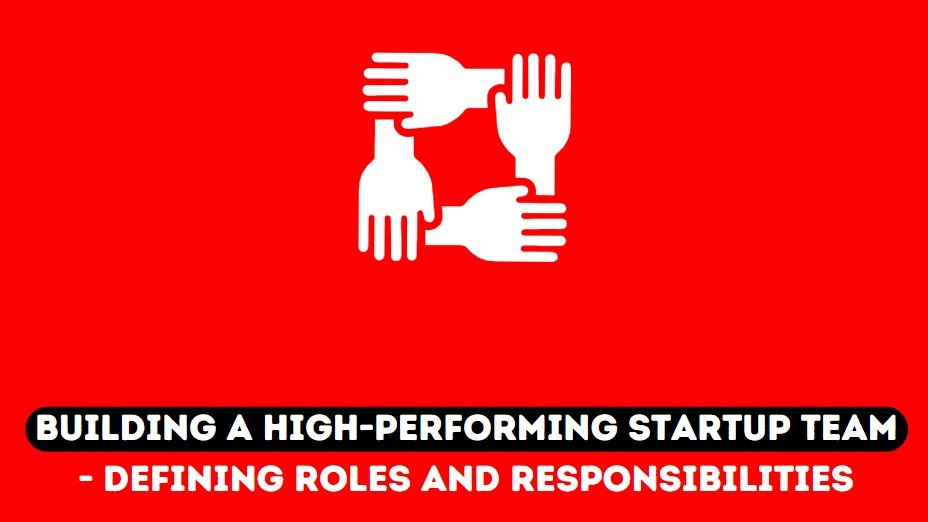
Having the right team is perhaps the most important driver of success for any startup. Even a mediocre product or business model can be elevated by a talented group of people who complement each other’s strengths and operate seamlessly to execute strategies.
On the other hand, the most groundbreaking idea can quickly fizzle and fail to scale if the founding team lacks cohesion and competence. That is why smart entrepreneurs obsess over building robust teams from the ground up, while making ongoing investments to motivate and upskill them.
This comprehensive guide will teach founders the best practices around structuring, managing and supporting startup teams to achieve optimal output.
Defining Roles and Responsibilities
The first step is identifying what core roles need to be filled based on your current startup stage and objectives. While the founder(s) often wear multiple hats initially, you need to add specialized experts incrementally.
Common startup roles include:
- Engineering: Software developers, UX/UI designers, QA testers
- Marketing: Content marketers, social media marketers, growth hackers
- Sales: Business development reps, account executives, sales ops
- Finance: Accountants, financial analysts HR/Recruiting: Generalists or specialists Other roles like product managers and customer success experts can be useful for startups with established traction.
Apart from outlining the key responsibilities under each role, also maintain a responsibility assignment matrix that maps every important function or task to specific team members across departments. This prevents confusion and ensures accountability.
In a scrappy early-stage environment, have team members pitch in on activities beyond formal job scopes while keeping the core roles somewhat flexible. Formalize structures only after product-market fit and repeatable processes are established.
Sourcing the Right People
The adage that a startup team is only as strong as its weakest link rings very true. Hence, leave no stone unturned while searching for your A-players.
Leverage your networks and get references from trusted connections while scouting for talent. Figure out not just what they have accomplished, but how they operated in previous roles.
Regardless of specialty, team members should demonstrate these personal traits:
- Strong work ethic and ownership mentality
- Willingness to roll up sleeves beyond formal scope
- Creative problem-solving skills
- High emotional intelligence
- Aligned values and growth mindset
Have potential candidates go through structured, competency-based interviews with advance interview management software that map their experience and soft skills back to the role requirements before hiring.
Verifying backgrounds, qualifications and past employment through reference checks is also vital while making final selections.
Structuring Your Startup Team
Startups tend to favor flat organizational structures given the rapid pace of innovation and smaller team sizes especially at inception. However, introduce some level of hierarchy once the team exceeds 15-20 people for more streamlined decision-making. Here are some structural considerations:
- Maintain open communication between different roles
- Set guidelines around meeting cadences and status updates
- Standardize protocols for tooling and document sharing
- Promote collaboration through centralized knowledge repositories
As departmental strengths get added, it becomes prudent for founders to delegate ownership for broader functions – like product, engineering, marketing etc. – to those executive leads for guidance. However, avoid siloed thinking at all costs.
Setting Up Your Team for Success
After talent acquisition, your responsibility is to ensure each new team member quickly gets up to speed and primed to contribute at their fullest potential.
Firstly, have structured onboarding programs covering:
- Company history and vision
- Current business metrics and OKRs
- Familiarization with codebases and tools
- Mandatory policy and process training
Secondly, support continual learning and development opportunities through mentorship programs, hackathons, external workshops etc. to aid their professional growth.
Regularly collecting feedback at an individual or team level is invaluable for founders to track engagement and morale. Annual or semi-annual reviews also drive performance accountability.
Finally, maintaining trust and transparency between leadership and the wider team is integral to success. Celebrate wins collectively and own up to mistakes.
Keeping Teams Motivated
Startups involve tremendous momentum shifts – from peak optimism to crushing setbacks. As such, keeping employees motivated through uncertain times is an endless challenge.
In terms of mindset, clearly emphasizing ‘why’ the overall mission matters makes the tougher ‘how’ bearable. Further incentivization through performance-linked bonuses and employee equity drives greater purpose and engagement.
Creating fun team activities, offsite trips or retreats are also invaluable bonding experiences that pay dividends for company culture. Promoting work-life harmony and self-care is essential for avoiding burnout.
Following through on people-focused commitments around growth, work flexibility or health benefits also builds tremendous goodwill internally.
Managing Team Challenges
With a bunch of talented individuals collaborating intensively, occasional conflicts or performance issues are inevitable. As the team expands, unwelcomed attrition also rears its head.
Be proactive in identifying interpersonal friction early and mediate 1:1 conversations for buried hatchets before it affects work. Similarly, align underperformers with mentors before taking stern action if needed.
While some churn is expected, reflect on reasons for critical team members quitting. Is it lack of growth opportunities? Loss of confidence in leadership? Uncompetitive compensation? Address the root cause through continual sensing of team morale.
Assessing and Iterating
Great leaders make team-building a journey of constant optimization, not a one-time activity.
Diligently track people metrics around team productivity, turnover rates and net promoter scores to sniff out any issues or opportunities. Study exit interview patterns for systemic gaps.
Address skill deficiencies by acquiring fresh talent or upskilling staff by funding external coaching and training programs. Also keep optimizing processes using team feedback.
Conclusion
In final analysis, a dream team is built not found. Assembling all the right people, helping them gel together, keeping them motivated and addressing challenges at a team and individual level requires tremendous founder commitment.
However, the payoff from higher group productivity and avoiding the costs of attrition or disengagement makes the effort invaluable. Use this playbook to build a thriving people powerhouse that drives your startup to industry leadership!



